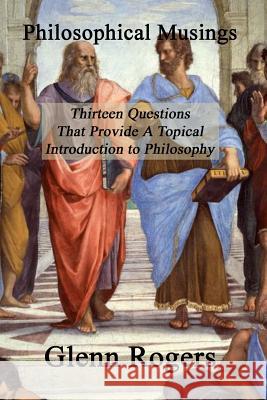Philosophical Musings: Thirteen Questions That Provide a Topical Introduction to Philosophy » książka
Philosophical Musings: Thirteen Questions That Provide a Topical Introduction to Philosophy
ISBN-13: 9780982837160 / Angielski / Miękka / 2013 / 456 str.
Philosophical Musings: Thirteen Questions That Provide a Topical Introduction to Philosophy
ISBN-13: 9780982837160 / Angielski / Miękka / 2013 / 456 str.
(netto: 168,51 VAT: 5%)
Najniższa cena z 30 dni: 176,45
ok. 16-18 dni roboczych
Dostawa w 2026 r.
Darmowa dostawa!
In Philosophical Musings, Rogers introduces students to philosophy by focusing attention on some of the most interesting and challenging questions philosophers have wrestled with for the past 2,500 years. In this engaging, thorough, and accessible introduction, Rogers lays a philosophical foundation by asking how philosophy began, how it developed, and why we should study it. With this basic foundation in place, Rogers then asks a series of questions that provide students with insights not only into what philosophy is, but into some of life's most important questions, including: What can be known? Why is there something rather than nothing? Does God exist? What is God like? Why is there evil in the world? What kind of beings are humans? Are we really free to choose? What is the purpose of life? Is there life after death? How should human beings live? In addition to introducing and discussing these provocative questions, Rogers includes readings from some of history's most significant philosophers, as well as analyses of arguments that have been made for each of the issues under consideration.
In Philosophical Musings, Rogers introduces students to philosophy by focusing attention on some of the most interesting and challenging questions philosophers have wrestled with for the past 2,500 years. In this engaging, thorough, and accessible introduction, Rogers lays a philosophical foundation by asking how philosophy began, how it developed, and why we should study it. With this basic foundation in place, Rogers then asks a series of questions that provide students with insights not only into what philosophy is, but into some of lifes most important questions, including:What can be known?Why is there something rather than nothing?Does God exist?What is God like?Why is there evil in the world?What kind of beings are humans?Are we really free to choose?What is the purpose of life?Is there life after death?How should human beings live?In addition to introducing and discussing these provocative questions, Rogers includes readings from some of historys most significant philosophers, as well as analyses of arguments that have been made for each of the issues under consideration.











